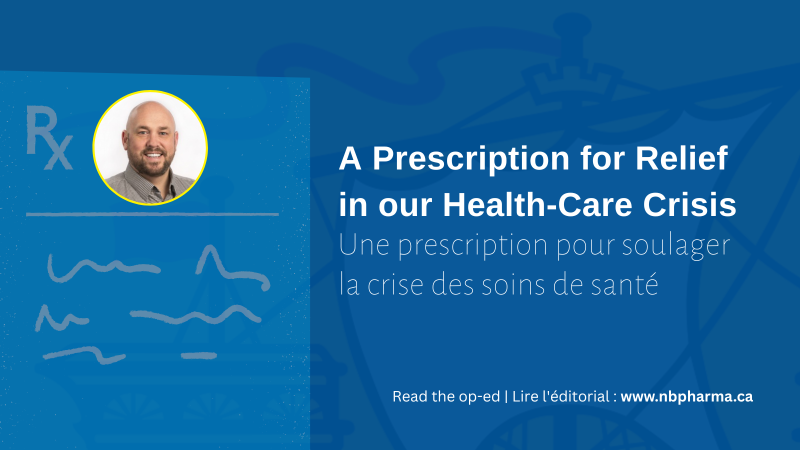
While the premiers seek increased federal funding for provincial health care, we know that any new money coming from these agreements needs to be strategically invested to achieve the desired results of greater access to health care services.
In his State of the Province address on Feb. 9, Premier Blaine Higgs said we must make the best of our scarce health-care resources and coordinate better. The first item the Premier listed when speaking of changes in the health-care sector in the past year was allowing pharmacists to diagnose and prescribe for more ailments. This is encouraging, and we hope government continues to expand coverage to pharmacists’ full scope of practice, giving more New Brunswickers immediate access to better primary health care.
Our neighbouring Maritime provinces have both recently expanded coverage, helping thousands of patients access health care at their community pharmacies instead of overwhelmed emergency rooms, doctors’ offices and clinics.
Prince Edward Island’s new Pharmacy Plus PEI program gives Islanders coverage for treatment at pharmacies for 32 minor ailments, including a variety of skin conditions, allergies, emergency contraception, yeast infections, urinary tract infections and many other less urgent health conditions.
New Brunswick pharmacists are already qualified to assess and prescribe for all the same ailments, but in PEI, government will now cover the cost, and patients can receive treatment at their pharmacy for free. In New Brunswick, patients have to pay out of pocket for all but four of those services if performed by a pharmacist, even though they’re free when performed by a doctor or nurse practitioner.
When the program was announced, officials expected over 27,000 ER and clinic visits in PEI would be diverted to pharmacies in the first year. However, the program has already helped 11,000 patients in its first three months.
In January, Nova Scotia announced the Community Pharmacy Primary Care Clinics pilot program, which enables people to access the same services with coverage for minor ailments. Pharmacists can also assess and prescribe for chronic disease care, meaning thousands of Nova Scotians with conditions such as diabetes, lung disease, heart disease and blood pressure issues can have their chronic conditions managed at their community pharmacy. The pilot is running at 12 pharmacies, with plans to expand in the spring.
These programs are diverting thousands of patients from emergency rooms, doctors’ offices and clinics, and we could be doing the same thing here in New Brunswick.
Most of the discussion in finding solutions to the health-care crisis in our province has centered around how government can attract more health professionals. There have been programs to create more seats for students in nursing programs and medical schools, and the provincial department and district health authorities continue to spend on recruitment efforts in countries around the world.
Despite these important efforts, recruitment is still a challenge, which is why, as Premier Higgs has said, we need to do more with the scarce health-care resources we have. It’s important government not lose sight of changes within the current system that could bring immediate improvement.
For many of the 59,000 New Brunswickers without access to a doctor or nurse practitioner, the first step in having a minor ailment assessed is a visit to an emergency room or walk-in clinic. Of course, our hospitals and clinics are so understaffed and overworked, wait times can be frustratingly long, especially for things deemed non-urgent care.
We’ve heard concerns that being treated at a pharmacy could interrupt continuity of care. In other words, if a pharmacist treats you, how will your doctor know? Will there be gaps in your health records because you’re dealing with different health-care professionals?
No. For New Brunswickers without a family doctor today, the unfortunate reality is there is often no continuity of care. People bounce around from emergency rooms to clinics, to 811 and eVisit, and their pharmacist is often the only health-care professional they can actually see on a regular basis. For those with a doctor, the New Brunswick College of Pharmacists already requires a pharmacist to notify a patient’s doctor of any change in prescribed treatment, so there is no gap in continuity of care.
It is irresponsible to insist certain services be performed only at hospitals or in a physician’s or nurse practitioner's office when there are other qualified health-care professionals, such as pharmacists, standing on the sidelines. A covered health service should be a covered service regardless of provider.
We know government officials have an enormous responsibility to deal with the many issues facing our health-care system. Of course, activating pharmacists would not solve all of our health-care challenges, but covering treatment of minor ailments is a prescription for relief, and would divert thousands of patient visits. This would help relieve some of the strain on our system and the pressures on health-care professionals in our hospitals and clinics.
Pharmacists are the most accessible health-care professionals, and it’s time to acknowledge the contribution community pharmacy can make to our health-care system. Pharmacists are already here, already trained, fully qualified, and ready to help. If the political will is there, we can have a much greater impact on New Brunswick’s health-care system.
Andrew R. Drover
President,
New Brunswick Pharmacists’ Association
This Op-Ed appeared in the Telegraph-Journal online edition on Wednesday, March 8, 2023.